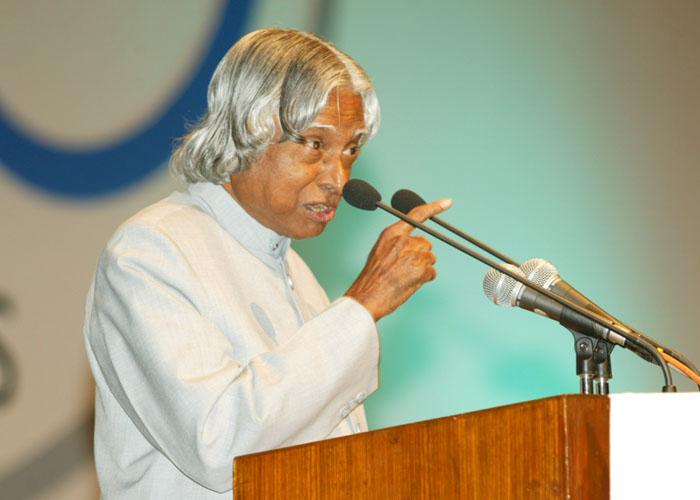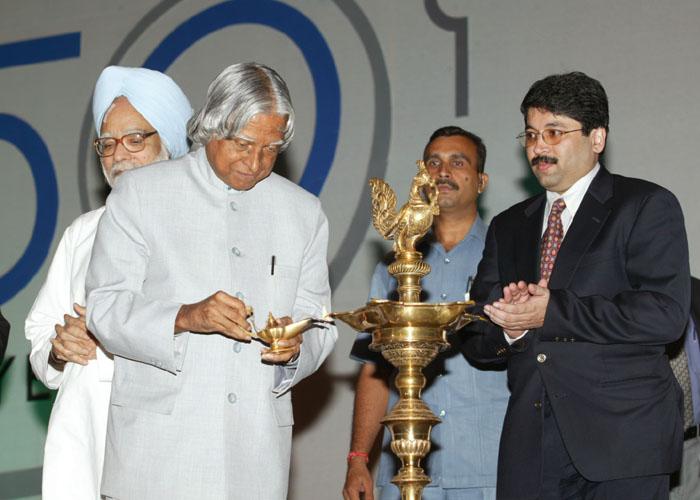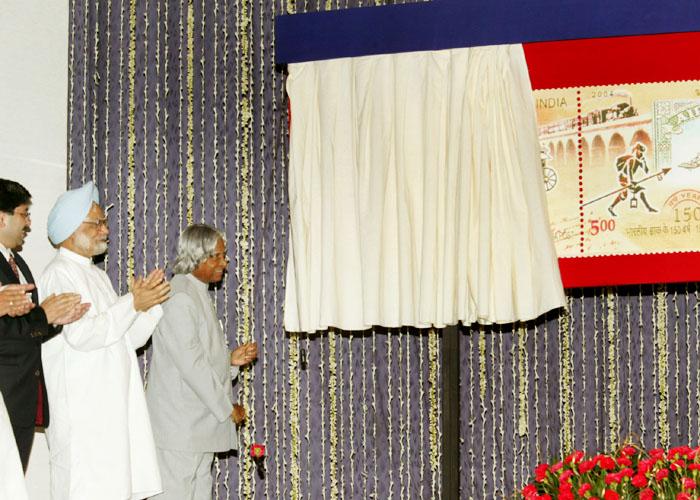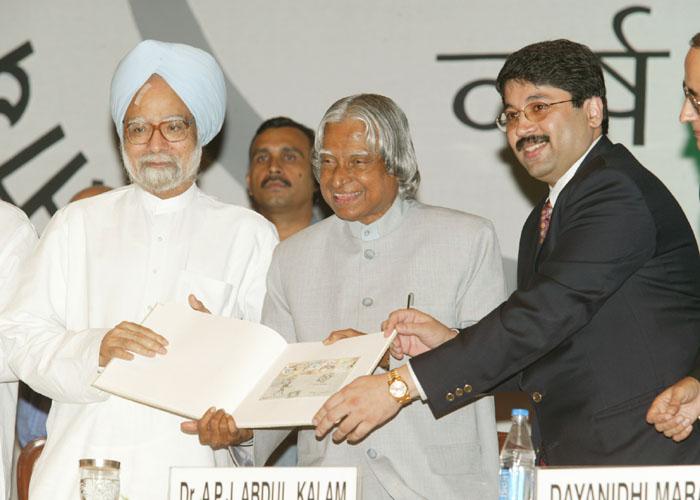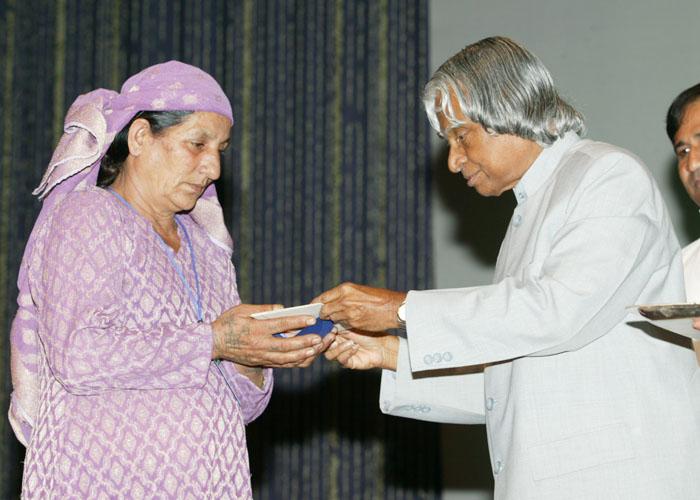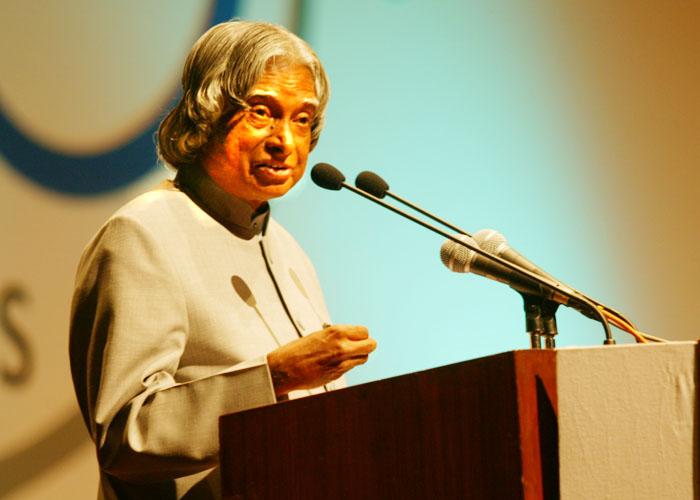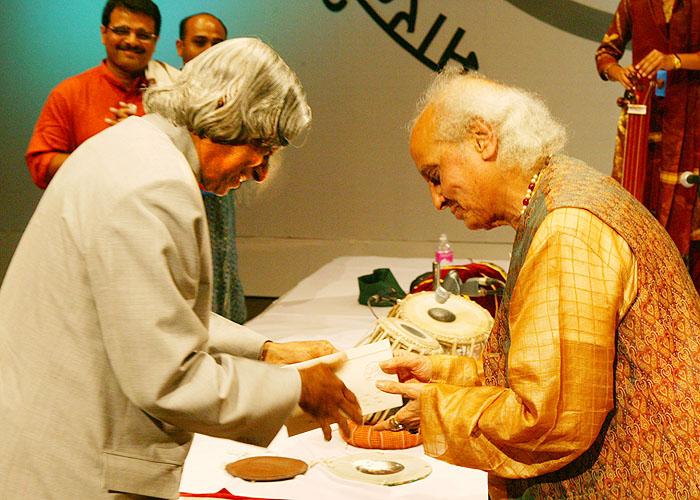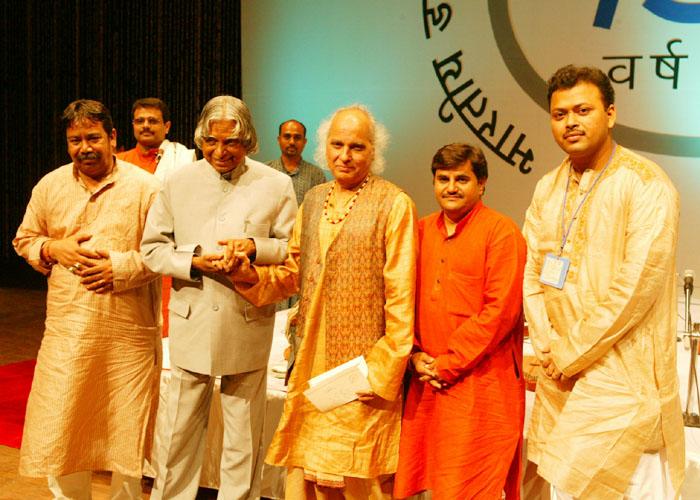Address At The Inauguration Of The Sesquicentennial Celebrations Of India Post
New Delhi : 04-10-2004
Vision for Resurgent India-Post
I am indeed delighted to inaugurate the Sesquicentennial Celebrations of India Post. My greetings to the organizers, government functionaries, all members of the Department of Post including all the Post Office Personnel and their families working in far flung areas of the country during this historic occasion. Post Office is the only institution in the country, which touches every person's life. This is demonstrated by the fact that whenever government or non-government agencies attempt to reach the largest number of people they think of the Post Office. I would like to congratulate the pioneering spirit, resilience and the glorious traditions of providing quality service of this Department, which is now 150 years old, to the common man spread in all parts of the country. If we have to recreate this organization today, it will cost over Rs. 50,000 crores. I note the accumulated savings deposits today amounts to over Rupees three lakh twenty five thousand crores, which is almost equivalent to the deposit of a leading nationalized bank in India.
Technological Growth
There has been considerable technological change in the communication system in the 20th century. With the introduction of fax, e-mail, Internet, video conferencing, tele-education, tele-medicine; the concept of communication has considerably changed. Now the information-communication is moving electronically from one end to other end and the need for physical movement of information is gradually coming down and is being restricted to physical commodities like parcels, gifts etc. With these changes, there is a need for creating a new vision for the vibrant post office system.
Strength of India-Post
The strength of India-Post lies in its people. Post Office is an institution. Postmen have knowledge of the village and they have a lasting relationship with the people. The core strength of the Post Offices lies in its connectivity to each and every village and the personal knowledge of the postman of every house in the village. I still distinctly remember the runner who were the pioneers in giving this connectivity to the rural and remote areas. In the new environment where there is an urgent need to develop our rural sector the Post Office system can become a partner in rural development since there are possibilities of new connectivities. Towards this end, I would like to make the following suggestions.
Providing Urban Amenities in Rural Areas (PURA)
We have developed a rural development model, which is based on providing connectivities such as physical, electronic and knowledge connectivity. Electronic Connectivity to the groups of villages through broadband, satellite and wireless for last mile connectivity would lead to Knowledge Connectivity through tele-education and tele-medicine. Also, as you are aware EDUSAT has been launched on 20th September 2004 which will enhance the education network for schools via tele-education network connected to Educational institutions and universities. In addition, the land and wireless connections now available all over India, can be integrated to provide various forms of connectivities as required for the rural area. The major focus of PURA would be on entrepreneurship, sustainable employment, economic growth and marketing (local vs. global). To begin with, in the entire country we propose to have nearly 7000 PURAs. At present there are 1,30,000 post offices in the rural areas out of a total of 1,56,000 post offices in the country. This means we can have nearly 19 post offices per PURA. These Post Offices located in the PURA complex can be identified as a hub for the provision of electronic connectivity and knowledge connectivity to the village community leading to economic connectivity of the village clusters. Post offices at various levels of operations can be the partner in rural development, since the post offices are already linked to the people.
Knowledge connectivity to rural India
The rural economy can be enhanced if we can provide knowledge inputs at the right time to the farmers, artisans, craftsmen, small-scale industries, self-help groups and entrepreneurs through these connected post offices. The rural people will need information on the state-of-the-art technology relevant to their area/region for getting better yield from their land at reduced cost of farming. They will also like to know about the arrival of the monsoon and the action to be taken in case of monsoon delays. Through mobile tele-education networks, the equipped post offices can reach the rural people and provide them information on the farm mix suitable for their land and also methods of multi-cropping and use of organic manure and pesticides. This will enable the farmers to understand the problem better and implement the solution in their fields. The students in the villages would like to have information on various courses of study in ITI, diploma education centres, vocational training centres, colleges and also about the types of skills which have greater employment potentials so that they can acquire right types of skills. They also would like to know about the employment opportunities and entrepreneurial opportunities within the PURA complex and other PURA complexes located in the Districts or States. The village community would like to know about the availability of clinics and tele-medicine links to District and Corporate Hospitals so that they can get the right type of healthcare support in times of emergencies. They also need information on the Doctors and clinics where vaccination and immunization support is available for the children. Information regarding the availability of the skill set in the village and products and services available from the small scale industries in the village complex would be useful for neighbouring PURAs and also distant PURAs where there is shortage of such skills.
Diversified Operations
I understand that the Post Office has diversified the postal operations into different areas through their business development programmes. They have created new products and services such as speed post, speed post passport service, media post, data post, e-bill post, e-post etc. which are definitely useful services to the common man and the business community. In addition, the post office is diversifying into financial services such as international money transfer service, distribution of mutual funds and bonds, electronic funds transfer, warrant payment, collection of telephone bills etc.
Management of Provident Fund
There are number of departments who are collecting Contributory Provident Fund from their employees. The growth of this task has been phenomenal and many departments are finding difficult in keeping track of the contributions made by the employees, adjustment of interest and provision of financial status to the employees. This task can be very easily outsourced to the Department of Post since they have gained adequate competence by maintaining the Post Office Saving Account for lakhs of individuals.
Financial Services
I am happy to note that the Department is constantly building the capacity of the Post Office to enable it to diversify the range and quality of the marketing and financial services. On the Insurance front, the Postal Department is planning to offer new products such as Group Premium Policy, Pensions Schemes and Term Policy. In addition for persons in rural areas who have only studied 8th standard or 10th standard but having right marketable skills, the post offices can also be used for micro-credit facilities so that they can become entrepreneurs.
Establishing Village Knowledge Centers
Another major role for post offices is to prepare our citizens for meeting the global challenges, coming out of globalization of economies, and help in the process of knowledge servicing. Post Offices can also contribute effectively in the operation of Village Knowledge Centres which is proposed to be created in each of the Panchayat in the country.
India has approximately 2.3 lakhs Village Panchayats. I visualize establishment of village knowledge centers in these Panchayats to empower the villagers with the knowledge and to act as a nodal center for knowledge connectivity for the villagers. Initially 100 remote Panchayats may be chosen for the Model Pilot project. Based on this experience, it will be possible to replicate Village Knowledge Centers in other Panchayats.
This Center will be equipped with 1000 books of different subjects. In addition, it will have a computer terminal, telephone connections, modem, printer, photocopier, camera, scanner, internet connection and other support facilities for functioning as a digital library. The knowledge center will provide hard copies of relevant pages to the members of the village, if required. Also the center can have facility for reading the text with an audio output so that people who are unable to read, can benefit from the library. The knowledge center can also be used for collection, digital storage and dissemination of village specific information pertaining to agriculture, craftsmanship, arts, artisanal techniques, informal judicial system practiced in village based on values, local remedies for simple ailments, village stories with moral values, village history, village folk songs, village cultural traditions, traditional medicinal practices followed in villages and village marketing information and methods. Such information presently is being transmitted through word of mouth and with changing generation, it is being lost. The postal personnel and the teams which will closely work with them can be deployed in the knowledge management center on part-time basis, which will not only enrich their contribution to the society but also provide cost-effective digital library and information services to the village community.
Maintenance of Land Records
The village revenue authorities are presently maintaining the land records manually and they collect the land tax from the landlords on half yearly and yearly basis. Generally there is a delay in the change of ownership in the land records leading to many disputes. The Post Office can help the revenue authorities in computerizing all the land records in the villages and also they can arrange billing to the landlords on yearly or half yearly basis. Such computerized billing will enable the landowners to pay the dues in time and also raise objections if there are any discrepancies in the ownership data recorded in the land records. This procedure, in addition to making the system of collection fool proof, will reduce the possibility of disputes in land ownership, which is a source of perennial problem in our villages. Post Office can be paid appropriate fee by the land record authorities for providing this service.
In addition, the Mapping of Neighbourhood project successfully executed by the Department of Science and Technology at Almora District with the voluntary participation of school children can be expanded in a major way by using post offices as focal points. However, it should be executed imaginatively with flexibility because any bureaucratic or hierarchical interference is not conducive to unleashing the creativity of children.
Transforming Vision into Reality
What is today in place is a physical network of Post Offices. To match the vision stated above, we have to put together an electronic network which will interconnect the entire postal network. It is today possible with the emergence of new communication technologies like broadband, CDMA, WLL, and FDMA etc. along with enormous governments/private initiatives in the form of making the bandwidth available throughout the country. To start with, right up to the village sub-post office level, a computerized network can be put together with a central server technology of appropriate nature. The village / branch post offices can also be linked to them either through the computer network or to start with through a communication link by way of landline or mobile telephone which can be even web enabled. This will straight away give the rural post offices ability to communicate with the urban centres, both ways, and provide a network which can facilitate the knowledge connectivity discussed. Over a period, through the concerted efforts all the stakeholders it is possible to create contents of appropriate nature right from agricultural practices to monsoon prediction, local medical knowledge to the advanced medical counseling centers etc. That all these things can be done for a fee can make the postal network also viable. Mere technological additions may not make the envisaged system effective; what is called for is large scale training and motivation of the Post Office personnel at all levels and particularly at the cutting edge in the village level, to be an empowered entrepreneur rather than a mere paid employee. Suitable linkages with the banking can ensure the rural youth and the unemployed to get financial support in the form of credit, which will enable them to expand their business horizon, provide in depth connectivity and thereby become owners of viable postal entities. Thus, it is a win-win proposition for the India-Post and its employees as well as to the millions of villagers and particularly the youth. A sense of urgency is required in implementing the programme of this nature which is in perfect consonance with the national development goal and harmony with the planned growth.
Core competence of Postal system
The strength of India-Post are three some viz. the trust of the people in the institution, its network and the human resources. This is a user friendly organization in the country and they have earned this friendliness through delivery of information and money order to the clients. They help in providing connectivity of hearts. By nature, it is an expanding and outgoing organization. These strengths should be leveraged and a growing system should be developed which will serve the national development cause while optimizing technologically the power of the post offices by becoming a partner in rural development. The completion of 150 years by India-Post, brings it face to face with opportunities as well as threats the opportunities due to the newly emerging technologies and the threats due to the competitive forces. The post office in collaboration with institutions like NABARD can become a main source for disbursing rural credit at economic interest rates which appears to be the crying need of the hour for our rural population. A living organization thrives by converting every threat into an opportunity and I am sure that the India-Post can rise up to its occasion and make substantial contribution towards transforming India into a developed nation.
New Millennium Postal System
I would like to share with you my visualization of the postal systems of the new millennium. The post office personnel can be empowered with a mobile telephone, a personal digital assistant (PDA) and the capacity to mobilize rural postal life insurance. This will enable him to provide to the remote rural dweller who needs to communicate for multiple purposes. The information stored in the PDA will enable him to give to the villagers the information needed for agriculture, craftsmanship, marketing, education, healthcare etc. to make meaningful use of inputs and outputs for promoting vibrancy in the rural economic system. The promotion of postal life insurance will bring social security at the door step of the villagers. All these things put together even calls for a renaming of the trained post office personnel in a village as a Rural Facilitator or Rural Knowledge Officer and those in cities as Knowledge Service Providers
Conclusion
The newly value added services like saving banks, social security measures like rural life insurances should be dove-tailed into this electronic and knowledge network so that resource mobilization, credit availability and investment assurance will become available to the rural and the middle class families who at present very often go through many agencies. The stepping-in of India-Post into the infrastructural and developmental process should become the theme for the resurgent India-Post of the 21st century.
I would recommend the following five missions for India-Post for the new millennium:
a) Transforming the post-man or post-woman to play a dual role of being the friend of the family and also information officer for empowering the villages. He or she will act as an interface between technology centre, knowledge and information base and the villagers.
b) Preparing the system of India-Post to provide an empowered network for promoting rural development.
c) Creating a networked infrastructure of all the post offices in the country through computers and tele-communications.
d) Establishing village knowledge centres with data base required for the rural development (agriculture, infrastructure, education, employment, healthcare, land records etc.) in collaboration with the relevant agencies.
e) Training the human resources to undertake envisaged activities.
f) Empowering the post office personnel in a village to be re-designated as rural knowledge officer with mobile telephone, PDA and other requisite facilities.
My best wishes to all members of India-Post for success in their mission.
May God bless you.

